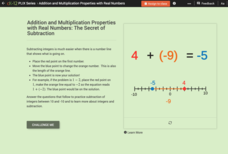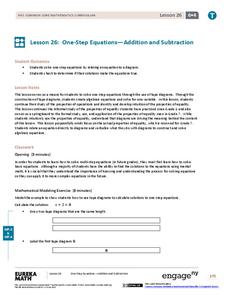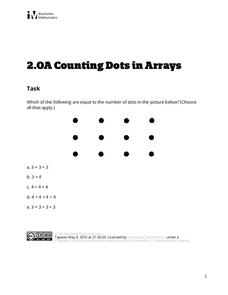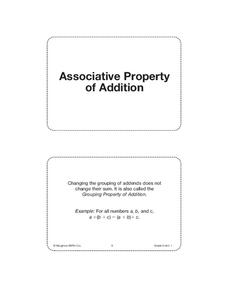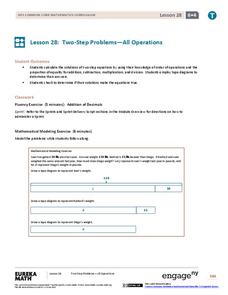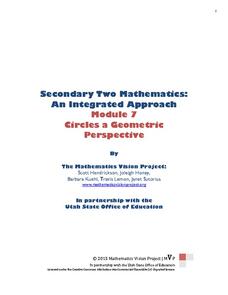EngageNY
Numbers Raised to the Zeroth Power
What in the world is the zeroth power? Examine the patterns of exponents as they apply to the zeroth power. Scholars apply the zero property to simple exponential expressions in this fourth lesson in a series of 15. The examples include...
EngageNY
Matrix Addition Is Commutative
Explore properties of addition as they relate to matrices. Using graphical representations of vector matrices, scholars test the commutative and associative properties of addition. They determine if the properties are consistent for...
EngageNY
Matrix Multiplication and Addition
To commute or not to commute, that is the question. The 26th segment in a 32-segment lesson focuses on the effect of performing one transformation after another one. The pupils develop the procedure in order to multiply two 2 X 2...
CK-12 Foundation
Addition and Multiplication Properties with Real Numbers: The Secret of Subtraction
An interactive boosts mathematicians' knowledge of subtracting integers using a horizontal number line by way of multiple-choice, true or false, and discussion questions.
Charleston School District
Solving Equations with the Distributive Property
Now there are parentheses in these equations? As the lessons continue in this series, equations get progressively more complex. Eighth graders solve equations by applying the distributive property before using inverse operations.
EngageNY
One-Step Equations—Addition and Subtraction
Just one step is all you need to find success in solving equations. The 27th installment in a series of 36 teaches how to solve one-step equations involving addition and subtraction. Tape diagrams help future mathematicians in this task.
Illustrative Mathematics
Counting Dots in Arrays
Mathematical arrays can represent several different math skills, including counting groups, multiplication, and even area. In this specific task, learners are asked to identify the addition equations that are equal to a 3 x 4 array....
EngageNY
Writing Addition and Subtraction Expressions
Symbols make everything so much more concise. Young mathematicians learn to write addition and subtraction expressions — including those involving variables — from verbal phrases. Bar models help them understand the concept.
West Contra Costa Unified School District
Simplify Expressions and Solve Equations Using Two-Column Proofs
Increase understanding of the algebraic properties and their importance. Scholars justify their steps as they simplify expressions and solve equations. They formalize their work as two-column proof.
Houghton Mifflin Harcourt
Unit 1 Math Vocabulary Cards (Grade 5)
Associative property of addition, exponents, and variables are a few of the terms that a set of flash cards includes and are designed to support math vocabulary instruction. Cards offer a a bold-faced font as well as a thorough...
CK-12 Foundation
Addition of Integers: Number Blocks
A five-question interactive provides a horizontal number line where integers are stacked on top of one another to find solutions of addition problems. Mathematicians move numbers to the numbers line, as numbers build higher, the sum of...
EngageNY
Two-Step Problems—All Operations
Step 1: Use the resource. Step 2: Watch your class become experts in solving two-step problems. Scholars learn to solve two-step word problems in context. They use tape diagrams and algebraic techniques to break the problem into two,...
CK-12 Foundation
Properties of Multiplication in Decimal Operations: Balloon Animals
Commutive and associative properties are the focus of a five-question interactive. Dealing with decimal multiplication and addition, mathematicians solve multiple-choice and true or false questions using a model that moves balloons along...
Virginia Department of Education
Properties of Operations
Explore the definitions of algebraic properties through a hands-on activity. Individuals cut and paste examples and match them to the correct properties. After examining the provided examples, pupils create examples of their own.
EngageNY
Replacing Letters with Numbers II
Teach about properties properly. Individuals investigate the commutative and identity properties for both addition and multiplication. They see that the properties hold true for all values by using substitution to test out several examples.
EngageNY
The Distributive Property and the Products of Decimals
Make multiplication of decimals easier by applying the distributive property. Pupils investigate how they can use the distributive property to multiply decimals. After learning the strategy, they work on some practice problems at...
Kentucky Department of Education
Multiplication Grade 3 Formative Assessment Lesson
Guide multiplication lesson plan instruction with a formative assessment. Mathematicians are given two multiplication problems to solve and represent using the area model, equal groups, repeated addition, and word problems. Following the...
EngageNY
Addition and Subtraction Formulas 1
Show budding mathematicans how to find the sine of pi over 12. The third lesson in a series of 16 introduces the addition and subtraction formulas for trigonometric functions. Class members derive the formulas using the distance...
EngageNY
Solving a Linear Equation
Solving an equation is the art of creating simpler equivalent equations using properties of equality. Here, classes see that solving an equation is not always as easy as guessing. The lesson presents linear equations that scholars must...
Homeschool Creations
Skip Counting
Young mathematicians hop, skip, and jump their way to a deeper number sense with the help of these printable handouts.
Math Mammoth
Distributive Property
In this math activity, students are given 30 problems to solve involving the distributive property, variables, parentheses, and area problems. The final set of problems asks students to solve problems mentally, without writing them down,...
Flipped Math
Unit 1 Review: Analyze Graphs and Expressions
Get in one last practice. Pupils work through 12 problems and a performance task to review the topics in Unit 1. The problems cover analyzing and modeling with graphs, algebraic properties of equality, and adding, subtracting, and...
Mathematics Vision Project
Circles: A Geometric Perspective
Circles are the foundation of many geometric concepts and extensions - a point that is thoroughly driven home in this extensive unit. Fundamental properties of circles are investigated (including sector area, angle measure, and...
EngageNY
Mid-Module Assessment Task: Grade 7 Module 2
A seven-question assessment determines how well your learners understand the procedures to add, subtract, multiply, and divide signed rational numbers. Pupils show their understanding through problem-solving situations.



